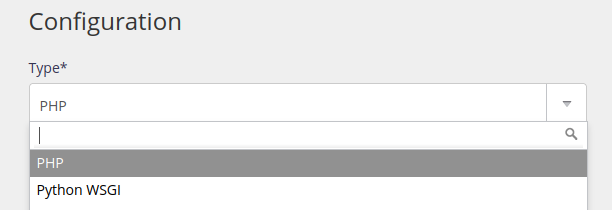Configuring PHP
Supported versions
| 8.5 | 8.4 | 8.3 | 8.2 | 8.1 | 8.0 |
| 7.4 | 7.3 | 7.2 | 7.1 | 7.0 |
| 5.6 | 5.5 | 5.4 | 5.3 | 5.2 |
| 4.4 |
The default version can be changed from the alwaysdata administration, under Environment > PHP. This is the version that is especially used when you start php.
Versions are not necessarily already installed.
Parameters (php.ini)
By default, the php.ini file activates a number of essential extensions and defines some basic parameters. This file is accessible in read from the following location $HOME/admin/config/php/php.ini. Here is its content (for an account configured on PHP version 8.2):
; Core settings
max_execution_time = 120
max_input_time = 60
memory_limit = 256M
post_max_size = 256M
upload_max_filesize = 256M
output_buffering = 4096
expose_php = Off
default_socket_timeout = 10
date.timezone = "Europe/Paris"
log_errors = On
error_log = /home/test/admin/logs/php/php.log
ignore_repeated_errors = On
ignore_repeated_source = On
mysql.default_socket = /run/mysqld/mysqld.sock
session.save_path = /home/test/admin/tmp
upload_tmp_dir = /home/test/admin/tmp
; Extensions
extension_dir = "/usr/alwaysdata/php/8.2/lib/php/extensions/no-debug-non-zts-20220829"
extension = ctype.so
extension = curl.so
extension = dom.so
extension = gd.so
extension = gettext.so
extension = iconv.so
extension = json.so
extension = mbstring.so
extension = openssl.so
extension = posix.so
extension = simplexml.so
extension = tokenizer.so
extension = xml.so
extension = xmlwriter.so
extension = xsl.so
extension = zip.so
extension = zlib.so
extension = mysqli.so
extension = pgsql.so
extension = pdo.so
extension = pdo_mysql.so
extension = pdo_pgsql.so
extension = fileinfo.so
extension = phar.so
; Zend extensions
zend_extension = /usr/alwaysdata/php/8.2/lib/php/extensions/no-debug-non-zts-20220829/opcache.so
opcache.lockfile_path = /home/test/admin/tmpTo change this php.ini, go to the Environment > PHP section (or if you want to manage it at the website level in Web > Sites). All of the directives that you define will be added to the initial php.ini file and can therefore overwrite the default values. There is no limit to what you can define, every PHP option is accessible.
You can also create .user.ini files to only apply parameters to some directories.
HTTP deployment
For a PHP application to be accessible via the web, create a site in the Web > Sites section of the alwaysdata administration by selecting the PHP type.

Versions management
Managing PHP versions per site results in a higher RAM consumption per account. Websites cannot then share PHP processes. It is therefore recommended :
- to prioritize the management of PHP at the account level (Environment section),
- to use few different versions per account,
- if you have to use several and a certain number of sites use the same version, to group their php.ini via the global php.ini and to switch them on the PHP default version.